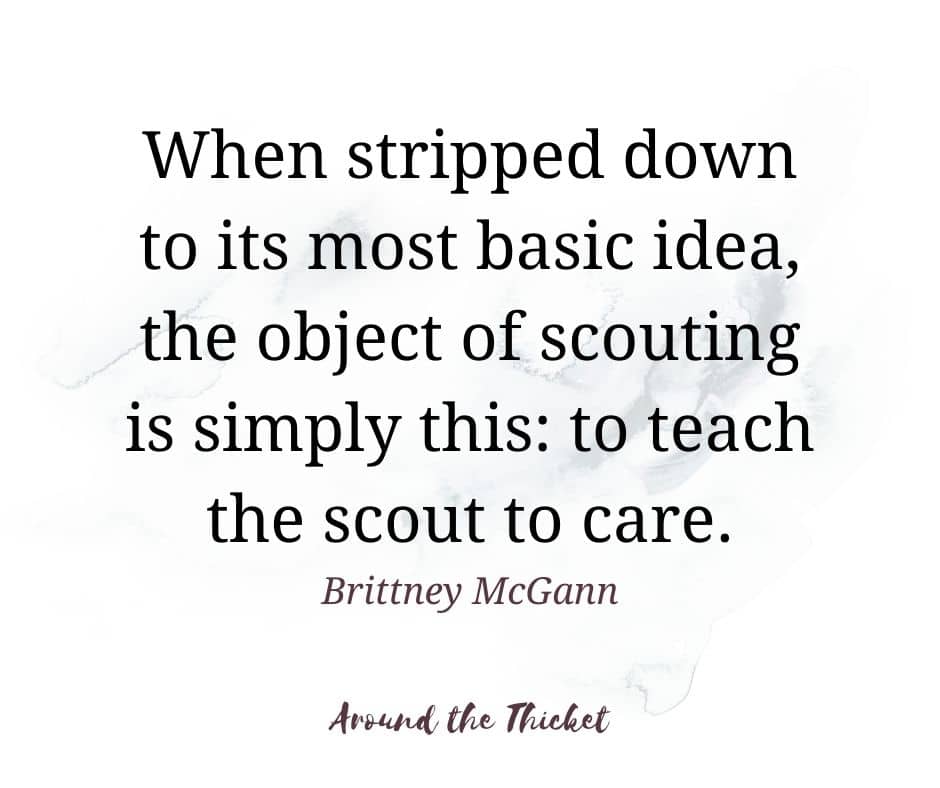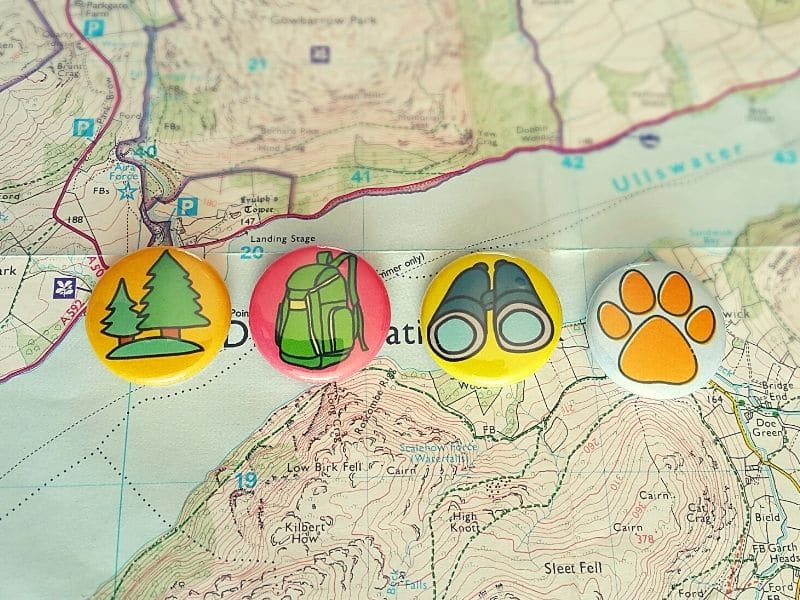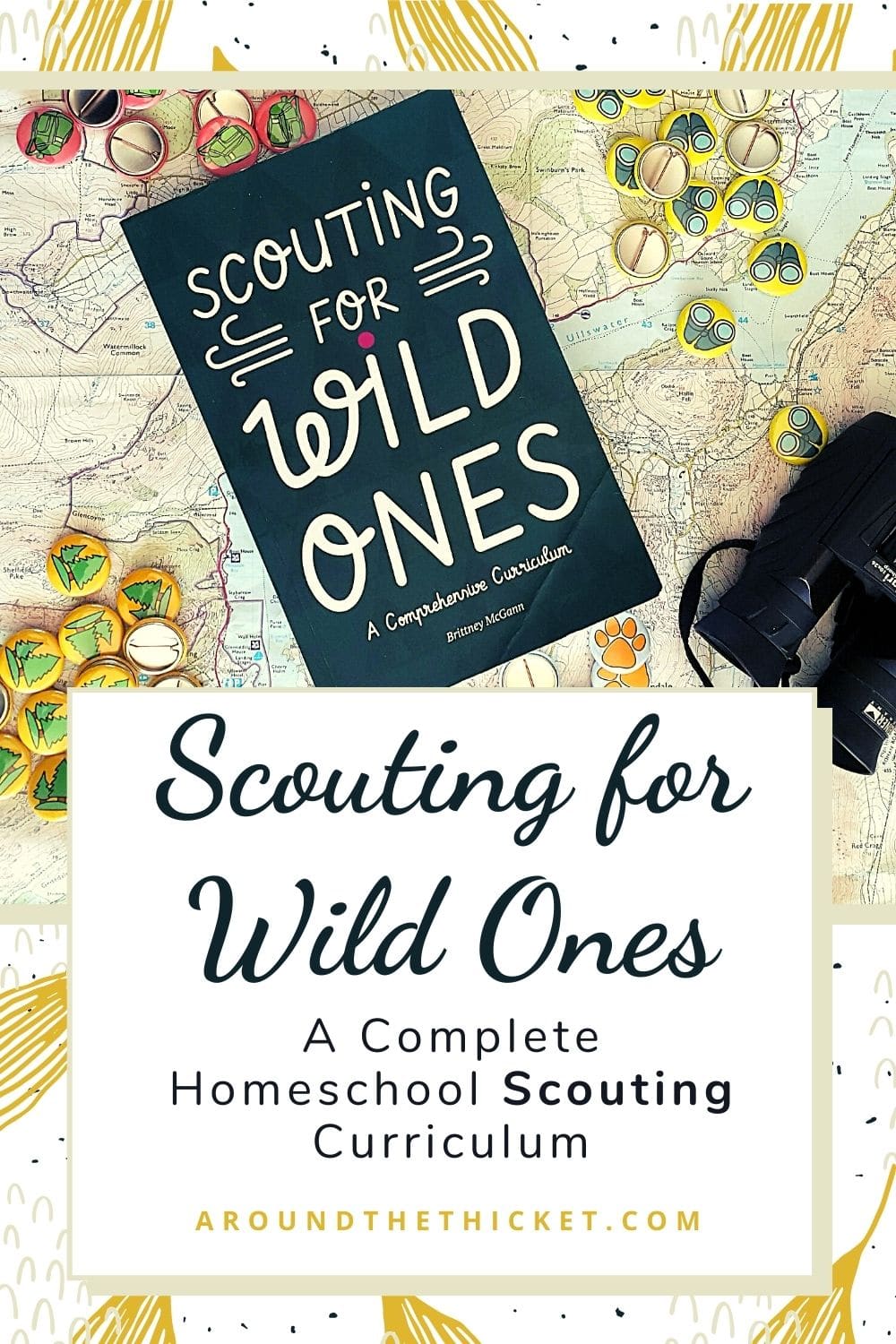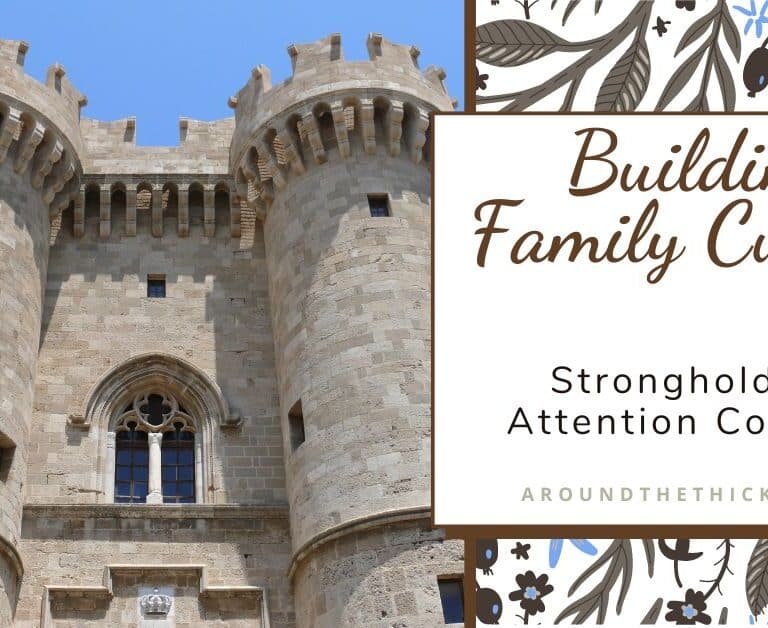Scouting for Wild Ones: A Review of a Homeschool Scouting Curriculum
The latest addition to our Charlotte Mason homeschool curriculum is scouting skills. Scouting doesn’t receive nearly as much attention as other Charlotte Mason staples, like nature study or artist study. However, there are strong connections. The modern scouting movement has roots in Charlotte Mason’s work, and scouting was taught in Parents’ Union Schools.
Scouting as a homeschool subject first came on my radar when listening to the Charlotte Mason Says podcast. I promptly purchased Scouting for Boys, the original book on scouting by Baden Powell, but it fell flat for me. After reading over it, I struggled to see how I could take the book and really bring the ideas to life for my kids in a practical, engaging way: the book seems to be written for children, but children who are older than my own. It covers the important ideas, but lacks a structure that I can adapt for a group of younger children. The book has sat on a shelf since then!
Fortunately, I wasn’t the only person who had this problem. This year A Gentle Feast (AGF) published Scouting for Wild Ones: A Comprehensive Curriculum by Charlotte Mason home educator, Brittney McGann. Julie from AGF generously sent me a copy from across the pond and, long story short, I really love this resource and want to share about how I’ve used it.
Charlotte Mason and Scouting: A Very Short History
Before I dig into the book, I think it’s helpful to see how Scouting and Charlotte Mason’s work are related. Charlotte Mason herself mentions Baden Powell’s book and scouting as part of a child’s ‘out-of-door life’ in Home Education:
Hundreds of families make joyous expeditions, far more educative than they dream, wherein scouting is the order of the day…The evil of the ready-made life we lead is that we do not discern the signs of the times. An alert intelligence towards what goes on in the open-air world is a great possession.
Charlotte Mason, Home Education
Baden Powell himself found the inspiration to establish the Boy Scouts through Charlotte Mason. A governess grained at Charlotte Mason’s teacher training college taught her pupil to successfully ‘ambush’ his father, who was then a brigadier general. When Baden Powell heard this story, he realized that scouting had educational value. (You can read the story in Baden Powell’s own words on Ambleside Online. You will want to search for ‘Baden Powell’ to find it.)
In this story, Baden Powell highlights why the Charlotte Mason philosophy fits so well with scouting:
(The governess’s) explanation of the situation was that a vital point in up to date education was the inculcation of observation and deduction and that the practical steps to this were given in the little handbook for soldiers of “Aids to Scouting.”
General Baden Powell, In Memoriam
Scouting brings together the habits of attention and observation, particularly of nature. It is natural that the Parents’ Union Schools adopted scouting as part of the curriculum, as we can see in this article from the Parents’ Review:
General Baden-Powell’s extensive scouting scheme is included in the curriculum of the Parents’ Union School…Thus scouting gives an attractive occupation in the open air, resulting in alertness and independence, and also affords moral training.
C. Cooper, Parents’ Review

What’s in the Scouting for Wild Ones curriculum?
When I first learned about Brittney’s book, I hoped it would take the lovely ideas behind scouting and put them into a format that made them accessible, useable, and easy to implement. I’m not the best person at inventing a plan and sticking to it. Most of my capacity for that goes towards our main school lessons, and I did not want Scouting to be another idea that came and went because I couldn’t get into a rhythm with it.
Fortunately, the book is laid out as an actual curriculum as the subtitle states. It is mostly individual lesson plans that fit under twelve units. You can see the table of contents by opening the preview pages, but the units are what you would probably expect in a scouting curriculum: observation, tracking, map skills, knots, and so on.
The lesson plans are nearly ‘grab and go’. They introduce the key idea for the lesson, suggest questions to ask your scouts, include a game or activity to practice the new skill, and then give some extra ideas of activities that could be done at home or used to extend the lesson for older children. The main work that I do to prepare is to read through the lesson and gather materials for the activity. I also type a few notes, since it’s often a bit wet here and I don’t want to have my copy of the book out.
At the end of each unit, there are suggestions for how scouts might earn a badge. I really appreciate this because my children, at this point, aren’t involved in any groups where they work toward specific goals. While I’m grateful to not have loads of trophies, stickers, and ribbons cluttering our house, this is one area where I can see that they are truly practicing a new skill. A Gentle Feast sells stickers to give as badges, but I’ve opted to have small pin badges made to put on rucksacks. I designed them in Canva (referral) and then had them made through Awesome Merchandise.

Leading Scouting Lessons in my Homeschool Group
There are certain homeschooling subjects that I’ve found difficult to gain traction with. These are mostly subjects that don’t need to be done every day and require more effort than just pulling out a book, like handicrafts and nature study. My solution is to create some accountability by arranging to cover these subjects with friends. When it came to scouting, I knew I would need to get other families involved. Fortunately, the other parents involved in my nature study group were excited to incorporate scouting into our fortnightly meetup.
We are now coming to the end of our first scouting unit (on observation skills). The response has been great from both parents and children. I have a younger group (the eldest children are eight), but there is active and enthusiastic participation in the discussion as well as with the games and activities. I do aim to keep things ‘light’, though. We haven’t tried out the extension activities, and I’ve lowered the requirements to earn a badge by a small amount.
Scouting is a great complement to our nature study sessions. Because I prefer to only loosely structure nature study, scouting balances this with time that is more focused and organized. I also appreciate that the lessons encourage discussion of character qualities, often pointing out how our skills enable us to be ready to help and serve.
Is Scouting for Wild Ones Suitable Outside of North America?
One challenge of using any curriculum developed in another country is that it almost always needs to be adapted. I’ve talked about how I approach this in my post on Customizing a Curriculum for my Charlotte Mason Homeschool. In fact, the first thing I did when I received Scouting for Wild Ones was to flip through to see what I would need to change.
Fortunately, the entire curriculum is extremely adaptable to places outside of North America. There are very few activities that are specific to certain seasons (you could start any time of the year) or that mention specific animals or plants. There are some links to North American field guides and other resources. However, they can easily be substituted for books and guides about your local area. (If you are in the UK, I love the fold-out guides from the Field Studies Council!)
My only other note is that there are some places where supplemental knowledge will be useful alongside the lesson plans. For example, living in England, my scouts will need to learn about public rights of way, rules about wild camping and where fires can be built. I’ll need to include this information when we start units on hiking, camping, and fire building. This is an area where I’ve benefited greatly from taking lessons myself, largely through a Mountain Training Hill Skills course.
Continuing with Scouting Skills
I’m so pleased with Scouting for Wild Ones. The curriculum is thorough, I enjoy teaching it, and the kids love the lessons. Scouting will absolutely continue to feature in my nature study group. We may need to expand our name, though, to give a better idea of what we do!
If you would like to learn more about Charlotte Mason and scouting skills, there are a few places to go. You can hear Brittney, the author, chat with Julie about scouting on a recent episode of the Charlotte Mason Show. Brittney has also given an interview to Commonplace Quarterly, including her tips for starting your own scouting group. And, of course, you can buy the book through A Gentle Feast.
Want to find your feet with the Charlotte Mason Way?

Grab my eight day mini course on the Charlotte Mason Essentials when you subscribe to my newsletter. You’ll get daily emails, a mini podcast series, and a printable workbook with reading assignments and action steps. You’ll be on your Charlotte Mason journey in no time!







Are you willing to share or sell the design for the pins? Thanks, Julia
Hi Julia,
I designed these in Canva, but if you are having them made into pins, you would want to set it up according to the spec given to you by the printing company. Would it still be helpful to have mine? I can definitely share, I’m just not sure how helpful it would be.
Amy
I would love the have your Canva designs too if that’s still a possibility. Just found this curriculum and agree that a badge or button would be more fun for keeping 🙂
Here is a link to a compass badge. You can swap out the little picture and change the colors to suit! Just remember you need to check the dimensions of whatever printing company you use!
would you be willing to share all the badge templates? Thanks!
Hi Jane, I’m so sorry but I don’t have templates available. If you are having them made, you would need to use the specifications from the printer anyway! It was a pretty simple job in Canva – good luck!